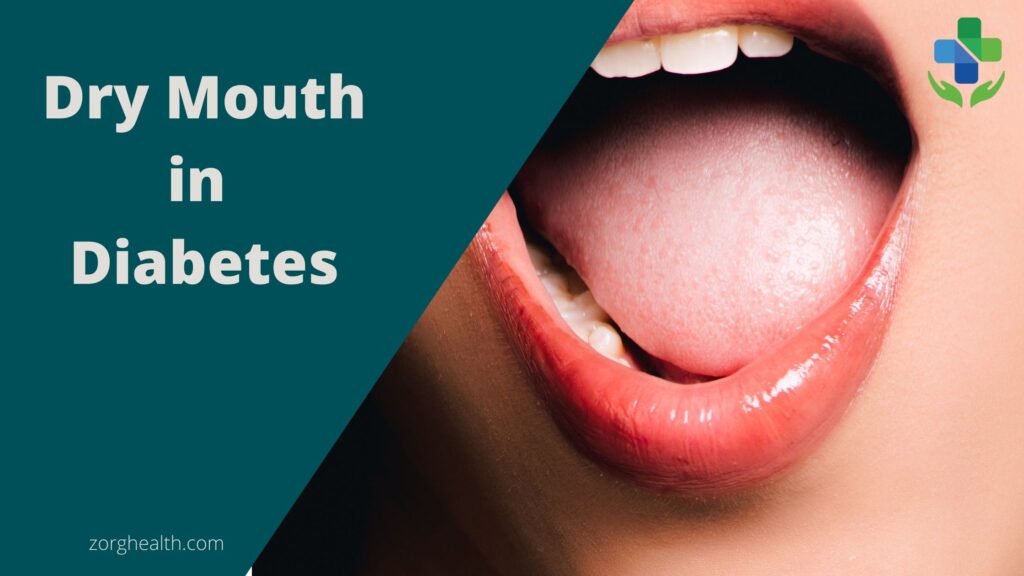The mouth has to be lubricated to perform different actions like chewing, swallowing, speaking, etc. If due for any reason saliva is not produced in an adequate amount of if you breathe from your mouth for a longer duration, you will experience dry mouth. Dry mouth is also called xerostomia. Xerostomia is not a serious condition by itself but it can be very problematic. Let understand the reasons for dry mouth in diabetes and how to manage the same.

Lately with the research and knowledge diabetes is emerging out to be a common cause of dry mouth or xerostomia. People who have diabetes often experience a constant dry mouth. There are other symptoms as well of dry mouth and these are-
1. Dry throat
2. Feeling thirsty very frequently especially at night when you need to get up frequently to sip water
3. Cracked lips or corner or mouth
4. Sharp burning in the mouth, more often on the tongue
5. Ulcers or red patches on the tongue
6. Altered taste
7. Difficulty in chewing, food sticking in different corners of the mouth
8. Having to put more effort into swallowing
9. Bad breath
10. Hoarseness of voice.
11. Thick or sticky saliva
As we all know in diabetes there are frequent changes in the blood sugar level. It’s very hard to keep blood sugar levels normal all the time and no one can manage it perfectly. Even repeated blood sugar readings don’t guarantee perfect control and a sudden spike in blood sugar level is expected every so often. High blood sugar levels lead to dry mouth or xerostomia.
Also, if you are suffering from diabetes and you have a persistent feeling of dry mouth that indicates that your blood sugar levels may be running high for a longer period. These high blood sugar levels not only give you a dry mouth but also make you more prone to gum and teeth diseases like tooth decay, gingivitis (gum infection), oral thrush (fungal infection), etc.
How to manage dry mouth in diabetes?
People with diabetes are advised to repeatedly check their blood sugar levels and keep a record. To fight dehydration from high blood sugar drink water every hour. If you have high blood sugar levels, visit your doctor. You may be given different drugs and a diabetic diet chart.
Apart from treating diabetes, your doctor may advise you to get some routine tests like Ultrasonography or sialometry (measures the rate at which saliva flows). sometimes just the alteration in dose or schedule of medicines you are taking might help to relieve xerostomia.
Sometimes bigger investigations might be required to make a proper diagnosis. Your doctor may ask you to undergo sialography through which any stone or mass can be detected. Also, patients suffering from dry mouth for a longer period should frequently visit dentists to rule out any tooth decay.
Home remedies to help relieve dry mouth in diabetes
The following measures stimulate saliva flow and leave a moisturizing effect in the mouth.
- Have plenty of water (and suck ice cubes) throughout the day to stay hydrated.
- Limit consumption of salty, spicy, and sugary foods (example, cookies, toast, dry bread, dry meats).
- Increase intake of soft and moist foods (for example, soups, broths, sauces).
- Avoid habits causing dehydration (for example, avoid caffeine, sugar, acidic beverages).
- Cut down on smoking/alcohol.
- Suck sugarless candies or chew sugarless gum.
- Focus on oral hygiene of mouth (example, regularly brush, floss, and use alcohol-free mouthwash/fluoride toothpaste and rinse).
- Add moisture to your surrounding using an air humidifier.
- Use herbal products (for example, aloe vera, ginger).
- Breathe through your nose, instead of a mouth.
- Avoid Over-the-Counter (OTC) antihistamines or decongestants at the pharmacy (Instead, try a saliva substitute that has xylitol in it).
- Avoid wearing dentures during sleep.
- Consult your doctor before stopping certain medications.
- Visit your dentist regularly for dental check-ups.
Exercise regularly to keep your blood sugar levels in check and drink an ample amount of water to manage the dry mount in diabetes.
